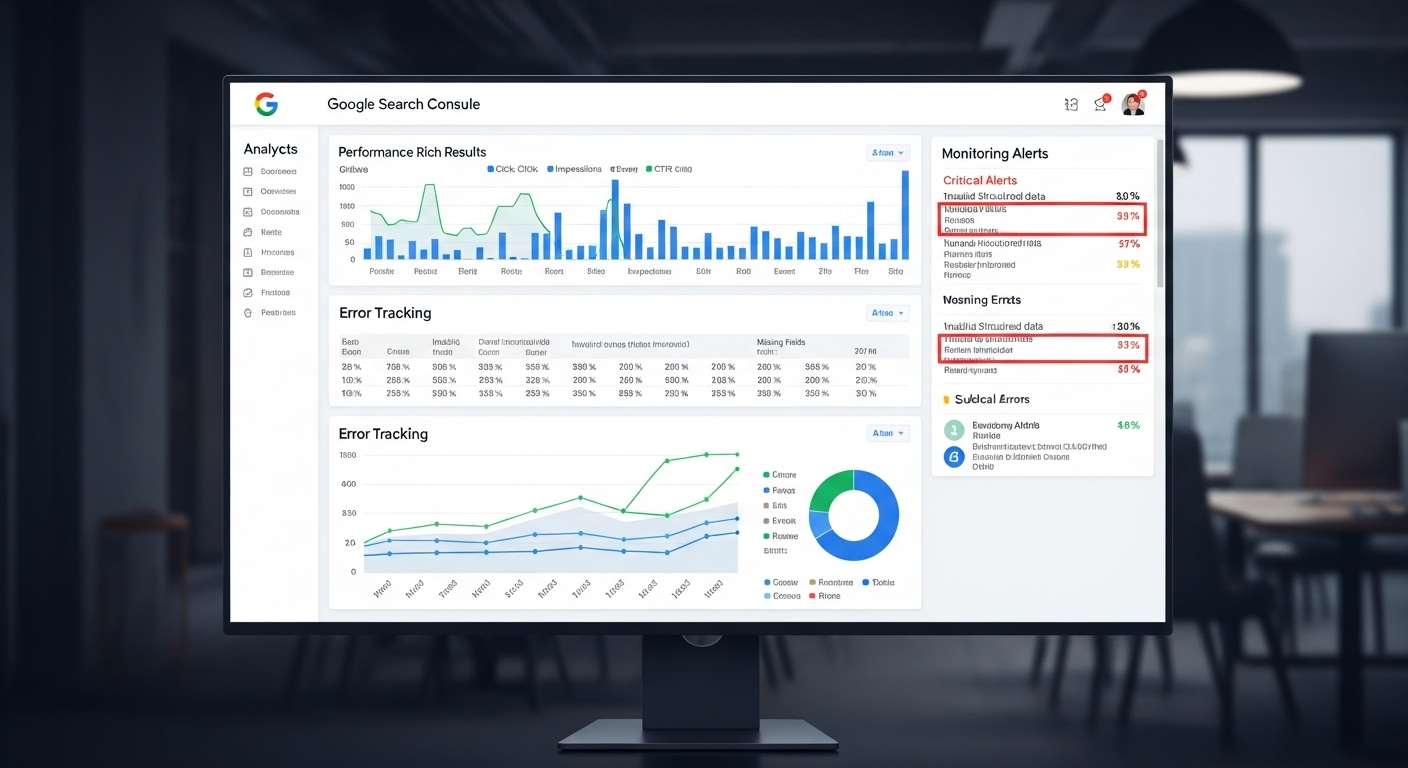Beyond Basic Implementation: Ongoing Schema Management
Even with proper schema implementation, maintaining consistent communication between your ShoppingFeeder data and Google Merchant Center requires ongoing attention. This guide covers advanced troubleshooting techniques, performance monitoring, and maintenance strategies to prevent future price mismatch issues.
Advanced Diagnostic Techniques
Schema Validation Across Multiple Tools
Don’t rely solely on Google’s Rich Results Test. Use multiple validation tools for comprehensive analysis:
- Schema.org Validator: Provides detailed technical validation beyond Google’s tool
- Bing Webmaster Tools: Offers different perspective on structured data interpretation
- JSON-LD Playground: Allows real-time schema testing and modification
- Google Search Console: Historical performance data and error tracking
Crawl-Based Testing
Use tools like Screaming Frog or Sitebulb to crawl multiple product pages simultaneously and identify schema inconsistencies across your catalog.
Monitoring Schema Performance
Setting Up Google Search Console Alerts
Configure Search Console to notify you immediately when new structured data errors appear:
- Navigate to Search Console > Enhancements > Products
- Set up email alerts for new error types
- Monitor the “Valid with warnings” section for potential issues
- Track rich result impression changes that might indicate schema problems
Key Metrics to Track:
- Rich Result Impressions: Should remain stable or increase over time
- Click-Through Rates: Schema-enhanced pages typically see 15-25% higher CTR
- Error Rate Trends: Sudden increases indicate systematic issues
- Coverage Changes: Drops in valid pages suggest widespread schema problems
Common Advanced Issues and Solutions
Currency and Regional Formatting
Different markets require specific currency formatting that must align with your ShoppingFeeder configuration:
<!-- Incorrect: Hard-coded currency -->
"priceCurrency": "USD",
"price": "$29.99"
<!-- Correct: Dynamic currency matching feed -->
"priceCurrency": "{{ cart.currency.iso_code }}",
"price": "{{ variant.price | money_without_currency | remove: ',' }}"Multi-Language and Multi-Market Stores
For international stores, schema must adapt to different markets while maintaining consistency with region-specific ShoppingFeeder feeds:
{% case request.locale.iso_code %}
{% when 'fr' %}
{% assign market_currency = 'EUR' %}
{% when 'en-CA' %}
{% assign market_currency = 'CAD' %}
{% else %}
{% assign market_currency = 'USD' %}
{% endcase %}Sale Price and Special Offers
Handling promotional pricing requires careful schema implementation to match your ShoppingFeeder sale price data:
{% if variant.compare_at_price > variant.price %}
"offers": {
"@type": "Offer",
"price": "{{ variant.price | money_without_currency }}",
"priceSpecification": {
"@type": "PriceSpecification",
"price": "{{ variant.price | money_without_currency }}",
"priceCurrency": "{{ cart.currency.iso_code }}"
},
"priceValidUntil": "{{ 'now' | date: '%Y' | plus: 1 }}-12-31"
}
{% endif %}App Integration Considerations
Schema App Conflicts
When using SEO apps alongside your custom schema implementation:
- Audit App-Generated Schema: Use browser developer tools to identify multiple schema blocks
- Disable Conflicting Features: Turn off app-based product schema if implementing custom solutions
- Test App Updates: App updates can reintroduce conflicting schema markup
ShoppingFeeder Integration
Ensure your schema implementation remains compatible with ShoppingFeeder updates:
- Monitor Feed Changes: When ShoppingFeeder updates product data mapping, verify schema alignment
- Test New Features: New ShoppingFeeder features might require schema adjustments
- Coordinate Currency Settings: Ensure schema currency handling matches feed configuration
Maintenance Workflows
Monthly Schema Health Checks
Establish a regular maintenance schedule:
- Week 1: Run comprehensive schema validation across product catalog
- Week 2: Review Google Search Console enhancement reports
- Week 3: Test variant-specific schema functionality
- Week 4: Analyze performance metrics and rich result impressions
Theme Update Procedures
Before updating your Shopify theme:
- Document Current Schema: Export/backup your current schema implementation
- Test Schema Post-Update: Verify that theme updates haven’t broken schema markup
- Re-implement if Necessary: Be prepared to re-add custom schema after major theme changes
- Validate Across Device Types: Ensure mobile and desktop schema consistency
Emergency Troubleshooting
When Price Mismatches Suddenly Appear
If Google Merchant Center suddenly reports widespread price mismatches despite no changes to your ShoppingFeeder configuration:
- Check Recent Changes: Review any recent theme updates, app installations, or code modifications
- Validate Sample Products: Test a representative sample of flagged products using Rich Results Test
- Compare Historical Data: Use Google Search Console to identify when errors began appearing
- Roll Back if Necessary: If recent changes caused the issue, consider reverting while implementing proper fixes
Performance Impact Monitoring
Schema implementation shouldn’t slow down your site. Monitor:
- Page Load Times: Complex schema can impact performance
- JavaScript Errors: Dynamic schema updates shouldn’t break site functionality
- Mobile Performance: Ensure schema doesn’t negatively impact mobile page speed
Success Metrics and ROI Tracking
Track the business impact of proper schema implementation:
- Reduced GMC Errors: Measure decrease in price mismatch flags
- Improved Rich Results: Monitor increased rich snippet appearances
- Higher CTR: Track click-through rate improvements from search results
- Better Shopping Performance: Analyze correlation between schema fixes and Google Shopping performance
With comprehensive schema management aligned with your ShoppingFeeder accuracy, you’ll maintain consistent, error-free product representation across Google’s platforms while maximizing your organic and paid shopping performance.
Final Recommendations
- Automate Where Possible: Use monitoring tools to catch issues early
- Document Your Implementation: Maintain clear records of your schema customizations
- Stay Updated: Keep current with Google’s structured data requirement changes
- Test Regularly: Don’t assume schema continues working without periodic validation
Remember: Your ShoppingFeeder provides the accurate product data foundation—proper schema implementation ensures Google receives that same accurate information through your website, creating perfect alignment across all channels.

